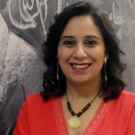Speakers

Mozn Hassan
Executive Director and Founder
Nazra for Feminist Studies

Amy Hawthorne
Deputy Director for Research
Project on Middle East Democracy
Marwan Muasher
Vice President for Studies
Carnegie Endowment for International Peace

Liz Sly
Beirut Bureau Chief
The Washington Post

Sarah Leah Whitson
Executive Director
Executive Director, Democracy for the Arab World Now
Moderator
Event Summary
On March 11, 2021, Arab Center Washington DC (ACW) convened a webinar titled “Ten Years after the Arab Spring: Assessing the State of Human Rights and Democratization in the Arab World.” Panelists were Liz Sly, Beirut Bureau Chief for The Washington Post; Marwan Muasher, Vice President for Studies at the Carnegie Endowment for International Peace; Sarah Leah Whitson, Executive Director of Democracy for the Arab World Now (DAWN); Amy Hawthorne, Deputy Director for Research at the Project on Middle East Democracy; and Mozn Hassan, Executive Director and Founder of Nazra for Feminist Studies (Egypt). ACW Executive Director Khalil E. Jahshan moderated the discussion.
Offering a general overview of the Arab Spring, Liz Sly said that its echoes linger ten years after it began, which indicates that “people have realized that … business as usual does not work.” She noted that a defining characteristic of the Arab world is that its demography has become a driver of revolution and demands for change. With the Arab world adding another 120 million people ten years after the Arab Spring, dictatorships must work on providing answers. She stated that in other regions of the world, demographic changes, wars, civil wars, and the like were followed by periods of prosperity and better economic conditions—but this is not the case in the Arab world. Instead, authoritarian regimes offer more oppression, which forces people more and more into the streets to demand change. She added that people are also demanding an end to daily indignities, official corruption, and neglect. Sly gave examples from protests in Lebanon and Iraq where economic conditions have deteriorated and repression has increased. She contrasted the Egyptian and Tunisian cases where the former has gone in the direction of more authoritarianism and the latter has become more democratic and open despite its continuing economic troubles. Sly ended her presentation by saying that she is not optimistic about the future of the Arab world.
Marwan Muasher began by recognizing the importance of the question about what went wrong so that the Arab Spring failed. He then posed another question about the reasons the old Arab political order was able to sustain itself. He highlighted his belief that contrary to many diagnoses, the Arab Spring is not dead and has not failed, pointing to the fact that ten years “is too short a period of time to judge whether the Arab Spring has gone wrong or not.” Muasher contrasted the Arab experience to the European one, during which decades passed before democracy actually prevailed. He said that what is important to remember is that the Arab political order’s tools for repressing change and buying off its populations are slowly failing. With the decline of oil revenue that used to sustain this order, “the carrot and stick that Arab governments used to exploit to keep the peace are no longer there.” Muasher believes that the wave of the Arab Spring of ten years ago is not over, pointing to what is happening in Lebanon, Algeria, Iraq, and Sudan as waves that are likely to be followed by other waves because the frustration remains. He also highlighted the positive case of Tunisia that could be a model holding many lessons as well as the important role that civil society is playing in the Arab world today.
Examining the state of democracy and human rights in the Arab world, Sarah Leah Whitson paid special homage to activists and journalists by leading a minute of silence to honor their life and struggle. She said that the uprisings ten years ago were against tyrants in Egypt, Syria, Libya, Bahrain, Tunisia, and other countries. Whitson lamented what she considers an abandonment by the international community of revolutionaries who needed solidarity, stating that “unlike the revolutionaries of the 1960s, there was no nonaligned movement or even a pan-Arab movement to support them.” She said that the forces of status quo––Saudi Arabia, the UAE, Egypt, and Israel––are uniting today more than ever before. Israel, she noted, is a natural ally of authoritarians in the region. She voiced her hope that Syria and Yemen can conclude their wars but expressed doubt that this would be possible, pointing to what she said is a harmful American policy in the Middle East. Whitson accused the American government of being just as guilty as authoritarian regimes in the Arab world, mentioning the Biden Administration’s stand on the International Criminal Court and Saudi Crown Prince Mohammed bin Salman. She called for a major recalibration of American foreign policy.
Amy Hawthorne asserted that “at this moment, authoritarianism has won in the Middle East and North Africa” and that the past decade has been disastrous for the quest for rights in the region. Some of the main reasons, she explained, are that those who hold on to power are stronger than those who are demanding democratic change. The powerful regimes, she said, have enjoyed significant international backing in addition to leniency by western supporters. Another reason is that authoritarians have gone very far to keep their power, by breaking red lines and norms. Hawthorne added that the regimes labeled pro-democracy forces as terrorists in order to silence dissent. In countries like Syria, the scale of brutality—overwhelmingly by the regime and its supporters—is great and has created “an open wound that will continue to be there a long time,” she said. She reminded the audience that the conflicts in the region began when the people demanded basic dignity and rights; it was later that the situation evolved into geopolitical or regional interstate conflicts. Hawthorne also compared the experiences of Egypt and Tunisia, noting that at the beginning of the Arab Spring, both were characterized as repressive police states with long-time dictators. Egypt now is going through an era of unprecedented repression and authoritarian rule, with Abdel-Fattah el-Sisi employing highly brutal means to enforce his power, especially through the military. For its part, she said, Tunisia has seen huge progress in rights and freedoms, even if it still faces some problems economically. Hawthorne stated that the people in Tunisia now have an important opportunity to rebuild their society based on real gains in human rights and freedoms, pluralism of the political system, diversity of political voices, and fairness of elections.
Focusing on the role of women, Mozn Hassan affirmed that what is happening in the region is a true revolution, one that has its roots in the independent feminist movement. She cautioned against the patriarchal way of thinking, an approach that many take at present, saying that it is important to analyze the movement from a new perspective, one that takes into account the context of the feminist movement. She highlighted the fact that the Egyptian activist women have been “working hard over the last ten years without a backbone,” without strong support, taking big risks to demand their rights. Often, she said, many forces in the country try to co-opt the movement and treat it based on discriminatory ways of thinking, going back to stereotypes of women’s roles in society. In fact, she said, the movement rose up ten years ago because it rejected the social contract foisted on women. Women are speaking up about mass sexual violence in the public and private spheres, Hassan continued, and refuse to accept the status quo. The feminist movement is made up of a diversity of women from different backgrounds and social classes and have urban and rural representation. “The international community needs to listen to us,” she said, and not treat Egyptian feminists simply as interlocutors but as agents who can spur change from inside. Women are targeted now more than ever before, she said, and this movement recognizes their hardships and sacrifices. It is demanding significant goals including security, safety, and psychological well-being. Hassan ended by entreating the international community to “be in constructive solidarity with us.”
Photo credit: Flickr/Hossam el-Hamalawy

